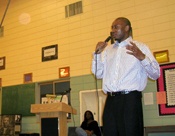
A new local television show is taking the issues that impact today's youth — at home, in school, on the streets and in the media — and bringing them into your living room. And it's doing it in real time — live, without a net.
"Teen Summit" is the brainchild of Karanja Crews, director of The NEXT: Generation of Leaders, a youth leadership development program. The show features a panel of youth from Portland-area high schools who debate current issues and events in a spontaneous setting, complete with calls from viewers.
Teen Summit's debut show, about the use of the "n-word" in popular culture and among African Americans, aired on March 25 on Portland Community Media Channel 11. The debut was an unqualified success, Crews said. There was a spirited, articulate exchange among the panelists, and the phone lines lit up with more calls than they could take.
"It was a pretty good discussion," Crews said with pride in his voice. "The phone was off the hook. The producer said that they never, ever, for any show, had that many phone calls. It was new for all of us, and it was an awesome, awesome show."
Crews and his youth education organization, SpeakLife, put on last year's innovative Portland Hip Hop Summit. The event proved popular enough that he was able to form a committee of interested youth to investigate staging future community awareness events in the same vein. The NEXT: Generation of Leaders and Teen Summit are the results of their efforts.
"We realized that, along with this program, we could have this TV show, Teen Summit," he said. "There was no other program in the community that was giving this kind of voice to our youth."
Crews and his colleague, Rob Egram, contacted producers with Portland Community Media, reached out to potential panelists in Portland-area high schools, and the project gained momentum from there. The show will air every other Saturday into the summer starting at 7 p.m. on Channel 11. The next broadcast is April 1; it will investigate negative African American images in the media and popular culture.
"We're going to talk about the Oscars," Crews said, "(about) how Denzel Washington and Halle Berry played negative roles and won Oscars, about how 'It's Hard Out Here For a Pimp' won the Oscar for best song. We're going to talk about how African Americans seem to get attention in the media mostly for negative reasons."
In the future, he said, the show will play host to candidates for public office and will tackle everything from politics and social issues to economicsandartistic expression.
Crews is still looking for more youth to participate on the show's panel, particularly young men. He envisions a rotating panel with new faces showing up for each broadcast.
"We've had a lot of girls come out, but not a lot of guys," he said. "We're looking for that 'Talented Tenth,' as W.E.B. DuBois described."
The first show's topic — the "n-word" — generated a range of responses both from the panel and from callers. Crews and Egram set up the discussion with a history of the word, its use as an oppressive tool and its increasingly common use among young African Americans. Is the word still hateful, or has its modern use (as "nigga") turned it into something else?
The word has outlived its day and should be done away with, said Kiana Penson, a Benson High School junior who appeared on the first Teen Summit panel.
"I think it's unacceptable," she said. "I don't think it should be used at all. People say that now it means something different, but I don't understand how a word that holds such misery can be transformed into a word that gives people comfort."
Penson's position was echoed by many of the participants, including Jacqui Patterson, a panelist from Madison High School.
"It's a topic that's relevant all the world around," Patterson said. "Not just the 'n-word,' but all racial words. I was happy that we got to express our feelings, because all of us in the group have different opinions about how the word should be used.
"I think it's stuck in our society and it's not ever going to go away. Personally, I think it's a hurtful word. Every time we use it, I feel like we're disrespecting the people who died during slavery."
The electricity and excitement surrounding the show, not to mention the energy generated by a charged exchange of ideas, left an impression on all involved, Penson said. Panelists and callers alike were impassioned.
"It was our first show, and it went better than any of us expected. It was really exciting," she said. "It's a really good program, and I advise anyone interested to get involved."
Patterson agreed.
"I had fun. I was so surprised that so many people called in, because it's not usually a very watched channel," she said. "We had a lot of people call in and get involved – men and women, older people and younger people.
"Most of us had never been on TV before; it was really fun. We're making a positive contribution."
Crews said the momentum from the debut broadcast has him fired up for the future, too.
"The show is going to inspire a lot of people," Crews said, "because they're going to see young people talking about positive things, things that are connected to us in the community."
High school students interested in participating on a Teen Summit panel should send an e-mail to Crews at [email protected].














































































































































































































































































































